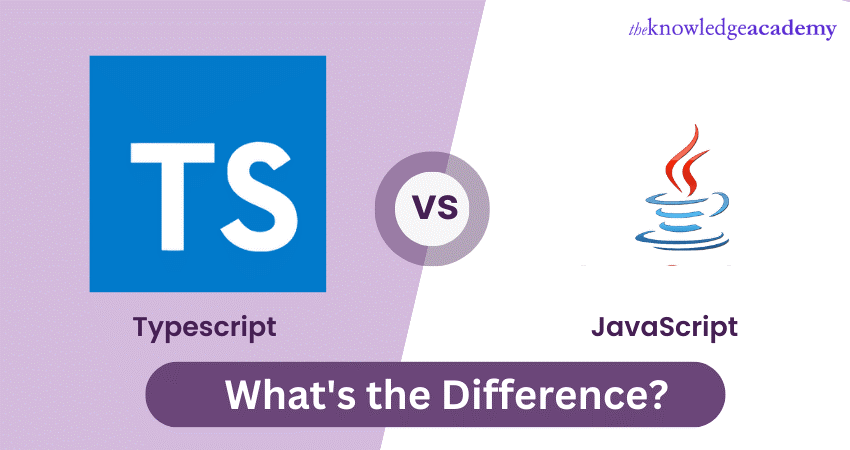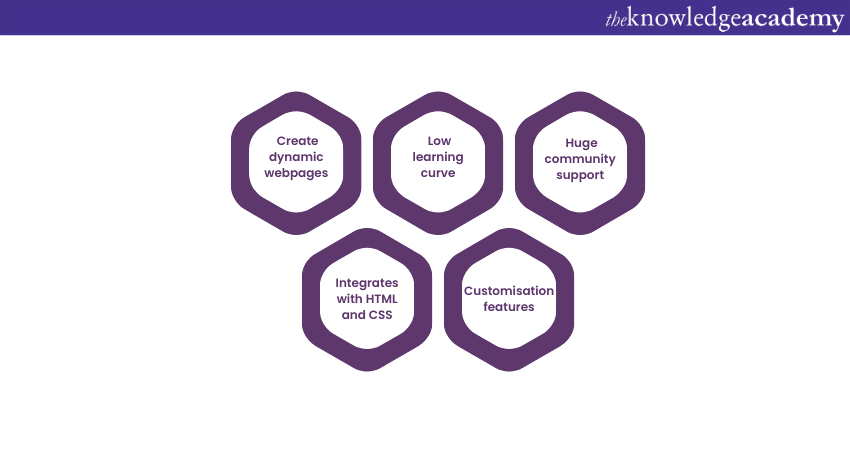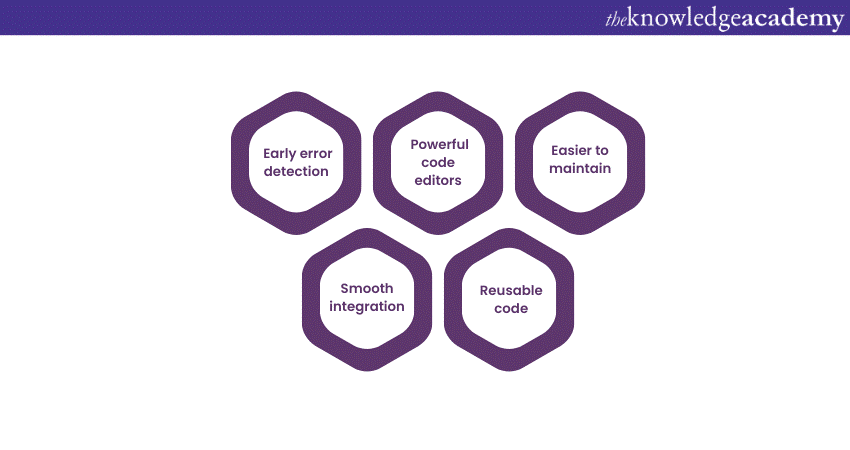We may not have the course you’re looking for. If you enquire or give us a call on +91-181-5047001 and speak to our training experts, we may still be able to help with your training requirements.
We ensure quality, budget-alignment, and timely delivery by our expert instructors.

In the world of Web Development, the debate of TypeScript vs JavaScript is ongoing, as both languages offer unique benefits. TypeScript, a statically typed superset of JavaScript, enhances code quality and maintainability with features like type checking and advanced tooling. On the other hand, JavaScript remains the foundation of Web Development, known for its simplicity and direct execution in browsers.
Understanding the strengths and differences between TypeScript vs JavaScript is crucial for developers choosing the right tool for their projects, whether they're working on a small-scale application or a large, complex system. This blog will explore both these languages, their key features and differences while explaining their use cases under different scenarios.
Table of Contents
1) What is JavaScript?
2) Benefits of JavaScript
3) What is TypeScript?
4) Benefits of TypeScript
5) TypeScript vs JavaScript Differences
6) Conclusion
What is JavaScript?
JavaScript is a broadly used scripting language that runs on the client side as well as the server side. It helps you create dynamic and interactive web pages. JavaScript is known for its versatility and ease of use, making it an excellent choice for web development.

Benefits of JavaScript
JavaScript is a popular programming language that offers several benefits, making it a popular choice for web development. Let's explore some of the advantages of using JavaScript:

a) Versatility and Ubiquity: JavaScript is universally supported by all modern web browsers, making it an essential language for client-side scripting. It enables developers to create dynamic, interactive web pages, enhancing User Experience. With Node.js, JavaScript has expanded beyond the browser, supporting server-side development, desktop applications, and mobile apps.
b) Ease of Learning and Use: JavaScript’s relatively low learning curve makes it accessible for beginners. Its syntax is similar to other programming languages, allowing developers to quickly start building applications. Its flexibility supports rapid prototyping, ideal for projects with quick development cycles.
c) Vast Ecosystem and Community: JavaScript boasts a vast ecosystem of libraries, frameworks, and tools that address various development needs. Popular frameworks like React, Angular, and Vue.js simplify the creation of complex applications through reusable components. The active JavaScript community provides abundant online resources, forums, and support for learning and problem-solving.
d) Integration with HTML and CSS: JavaScript seamlessly integrates with HTML and CSS, enabling developers to manipulate web page structure and styling. It allows for dynamic content modification, user interaction responses, and the creation of interactive elements, resulting in engaging user interfaces and responsive web applications.
e) Extensibility and Customisation: JavaScript’s dynamic nature allows developers to extend its capabilities through custom scripts, modules, and plugins. This extensibility enables the creation of tailored solutions and seamless integration with third-party libraries and APIs.
f) Continuous Evolution: JavaScript has undergone significant evolution, with regular updates to the ECMAScript (ES) language specification. These updates introduce new features and syntax enhancements, improving developer productivity and supporting modern programming paradigms. JavaScript continues to adapt to the demands of contemporary Web Development.
Unleash your creativity in Web Development with our comprehensive JavaScript For Beginners Course. Sign up now!
What is TypeScript?
TypeScript is developed by Microsoft and is a popular open-source programming language. It is considered a superset of JavaScript, meaning that any JavaScript code is valid TypeScript code. TypeScript introduces static typing, which allows developers to catch errors at compile-time rather than runtime. It offers enhanced tooling, scalability, and maintainability for large-scale projects.
Benefits of TypeScript
TypeScript offers several benefits that make it a compelling choice for web developers. Let's explore some of the advantages of using TypeScript:

a) Enhanced Type System: TypeScript introduces static typing, allowing developers to define and enforce types for variables, function parameters, and return values. This facilitates the early detection of type-related errors during development, preventing potential bugs in production. The static type system improves code quality, readability, and maintainability.
b) Improved Tooling and IDE Support: TypeScript benefits from robust tooling support, including powerful code editors and Integrated Development Environments (IDEs) like Visual Studio Code. These tools offer features such as autocompletion, code navigation, refactoring, and intelligent error checking, streamlining development and enhancing efficiency. The extensive tooling ecosystem includes a wide range of plugins and extensions.
c) Code Maintainability and Scalability: Static typing in TypeScript promotes better code organisation, modularity, and scalability. Utilising interfaces, classes, and modules helps create well-structured codebases that are easier to understand, maintain, and refactor. TypeScript’s type system serves as clear documentation, reducing confusion for developers and improving overall project coherence.
d) Seamless Integration with JavaScript: As a superset of JavaScript, TypeScript allows seamless integration into existing JavaScript projects. Developers can introduce TypeScript gradually, leveraging its static typing and additional features without needing a complete codebase rewrite, ensuring a smooth transition.
e) Rich Language Features: TypeScript extends JavaScript with advanced language features like classes, interfaces, enums, generics, and modules. These enhancements enable the creation of more robust, maintainable, and reusable code. TypeScript also ensures modern ECMAScript (ES) compatibility, allowing developers to use the latest JavaScript features, even if the target environment doesn’t natively support them.
Take your Web Development skills to the next level with our Web Development Training With TypeScript Training. Sign up now!
TypeScript vs JavaScript differences
Here, we will learn the key differences between TypeScript and JavaScript. Just as there is a massive difference between Java and JavaScript, there are also many distinctions between TypeScript and JavaScript. similarly, there are many differences between these two. Understanding these disparities will help you make informed decisions about which language to choose for your development projects. Let's dive into the dissimilarities between TypeScript and JavaScript:
Static typing
One of the significant contrasts between TypeScript and JavaScript is static typing. TypeScript enforces static typing, allowing developers to declare variable types and catch type errors during the compilation phase.
On the other hand, JavaScript is dynamically typed, allowing for more flexibility but potentially leading to runtime errors due to type mismatches.
Compilation and transpilation
TypeScript code needs to be compiled into JavaScript before it can be executed by the browser or server. The compilation process checks for syntax errors and performs type checking, ensuring a higher level of code correctness. JavaScript, being an interpreted language, does not require explicit compilation and can be executed directly.
Language features and tools
TypeScript extends JavaScript by introducing additional language features like interfaces, classes, modules, and more. These features promote code organisation, reusability, and maintainability. TypeScript also benefits from a wide range of tools and editors that enhance productivity and provide a better Developer Experience. JavaScript, on the other hand, has a simpler syntax and a vast ecosystem of libraries and frameworks built specifically for Web Development.
Scalability and Maintainability
TypeScript's static typing and object-oriented features make it more suitable for large-scale projects. By catching errors early and enabling better collaboration among team members, TypeScript enhances code maintainability and scalability.
JavaScript, while highly flexible and suitable for smaller projects, may require additional effort to maintain and scale in more complex scenarios.
Confused Between Java and JavaScript? Get Expert Insights and Uncover the Key Differences!
Type Inference
TypeScript has a powerful type of inference system that can automatically infer the types of variables based on their initialisation values. This reduces the need for explicit type annotations, making the code more concise. JavaScript, being dynamically typed, does not have built-in type inference, and developers need to manually specify the types or rely on runtime checks.
Null and Undefined Handling
In TypeScript, null and undefined are distinct types that are handled more explicitly. TypeScript provides features like strict null checks and optional chaining to help developers avoid null and undefined-related errors. JavaScript, on the other hand, treats null and undefined as interchangeable and may require additional checks to handle potential issues.
Development Experience
TypeScript offers a superior Development Experience compared to JavaScript due to its static typing and tooling support. The static type checking in TypeScript catches errors early during development, reducing the likelihood of bugs in production.
TypeScript's Integrated Development Environment (IDE) features, such as autocompletion, code navigation, and refactoring tools, enhance developer productivity. JavaScript, being dynamically typed, may require more extensive testing and debugging efforts.
Adoption and Community Support
JavaScript has been widely adopted and has a massive community of developers, making it easy to find resources, libraries, and frameworks. It has been the language of choice for Web Development for many years, ensuring extensive compatibility and support.
While TypeScript has gained significant popularity in recent years, it is still relatively newer, and its community, although growing rapidly, might not be as extensive as that of JavaScript.
Learning Curve
JavaScript has a relatively lower learning curve compared to TypeScript, making it more accessible to beginners. JavaScript's simpler syntax and loose typing allow for quick prototyping and experimentation.
TypeScript, with its additional language features and static typing, requires developers to invest time in learning these concepts. However, developers familiar with JavaScript can gradually adopt TypeScript without completely relearning the language.
Unleash the power of Java programming and unlock endless possibilities in Software Development with our comprehensive Java Programming Training!
Will TypeScript Replace JavaScript?
The short answer is NO! TypeScript, while closely related to JavaScript, is a different language that builds on JavaScript’s foundation. However, it won’t replace JavaScript. JavaScript remains a fundamental and popular technology in the Software Development industry, widely used for both client-side and server-side applications.
TypeScript, on the other hand, doesn’t run directly in web browsers; it must first be transcompiled into JavaScript. JavaScript is easier to debug and compile as it executes directly in the browser.
TypeScript isn’t suited for every project, and both languages have their own advantages and disadvantages. To stay current with enterprise Web Development trends, it’s important to adopt new technologies or frameworks to enhance business processes and Customer Experiences.
Conclusion
We hope you read and understood the differences between TypeScript vs JavaScript. Both TypeScript and JavaScript are excellent choices for Web Development. When it comes to choosing between TypeScript and JavaScript, it ultimately depends on your specific project requirements and preferences.
Unlock your Java programming potential and excel in building powerful applications with our expert-led Java Training. Sign up today!
Frequently Asked Questions
Is TypeScript Better than JavaScript?

TypeScript offers advantages like static typing and better tooling, enhancing code quality and maintainability. However, it depends on project needs. For smaller projects, JavaScript's simplicity might be preferable, while TypeScript shines in larger, more complex applications.
Can TypeScript do Everything JavaScript does?

Yes, TypeScript can do everything JavaScript does because it’s a superset of JavaScript. It adds features like static typing and interfaces but ultimately compiles down to JavaScript, ensuring compatibility with all JavaScript environments and functions.
What are the Other Resources and Offers Provided by The Knowledge Academy?

The Knowledge Academy takes global learning to new heights, offering over 3,000 online courses across 490+ locations in 190+ countries. This expansive reach ensures accessibility and convenience for learners worldwide.
Alongside our diverse Online Course Catalogue, encompassing 19 major categories, we go the extra mile by providing a plethora of free educational Online Resources like News updates, Blogs, videos, webinars, and interview questions. Tailoring learning experiences further, professionals can maximise value with customisable Course Bundles of TKA.
What is The Knowledge Pass, and How Does it Work?

The Knowledge Academy’s Knowledge Pass, a prepaid voucher, adds another layer of flexibility, allowing course bookings over a 12-month period. Join us on a journey where education knows no bounds.
What are the Related Courses and Blogs Provided by The Knowledge Academy?

The Knowledge Academy offers various Java Courses, including Java Programming and JavaScript for Beginners Course. These courses cater to different skill levels, providing comprehensive insights into Java Developers.
Our Programming & DevOps Blogs cover a range of topics related to JavaScript, offering valuable resources, best practices, and industry insights. Whether you are a beginner or looking to advance your JavaScript skills, The Knowledge Academy's diverse courses and informative blogs have got you covered.
Upcoming Programming & DevOps Resources Batches & Dates
Date
 Introduction to HTML
Introduction to HTML
Fri 28th Mar 2025
Fri 23rd May 2025
Fri 25th Jul 2025
Fri 26th Sep 2025
Fri 28th Nov 2025






 Top Rated Course
Top Rated Course


 If you wish to make any changes to your course, please
If you wish to make any changes to your course, please


